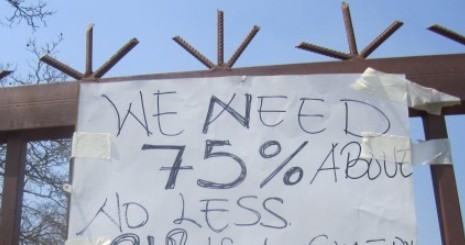Malawi trade unionists have told President Joyce Banda’s administration to take responsibility for the spate of industrial strikes that have hit the country, saying the actions are as a result of some economic reforms the new government undertook after coming into power.
Employees of various public institutions and companies have downed their tools, while others are threatening to take industrial actions demanding a pay rise; following the ever rising cost of living sparked by the Kwacha devaluation by 50 percent.
Recently, employees of Lilongwe and Blantyre Water Boards, Malawi Post Corporation, health personnel in public hospitals, Polytechnic lecturers and University of Malawi, UNIMA support staff, among others have gone on strike demanding a pay hike.
Chancellor college lecturers are also planning a strike demanding 113 percent salary increase.
On Monday morning, employees of Blantyre city council also begun their industrial action demanding a 150 increment.
But the government is failing to meet the workers demands arguing it does not have enough money.
However, General secretary of the Malawi Congress of Trade Unions, MCTU Robert Mkwezalamba said these actions are all justified considering the prevailing cost of living, which he says is a direct result of government’s decision to devalue the Malawi kwacha.
The MCTU General Secretary says, as a labour organisation, they believe that at the moment, the government has capacity to meet the needs of the striking workers.
Mkwezalamba said: “Government is a growing concern, we inherit everything. This issue has been there. All the leaders that are in PP have been in this country and they were with us when we were in the streets marching for better pension, working conditions.
“So there is no way government can be saying that it has no money. The government has money, we have heard politicians (the president herself) saying that the money I have received is too much for me to count.”
Meanwhile, the workers are questioning government’s move of “over raising” legislators’ sitting allowances, but denying them a reasonable raise.




